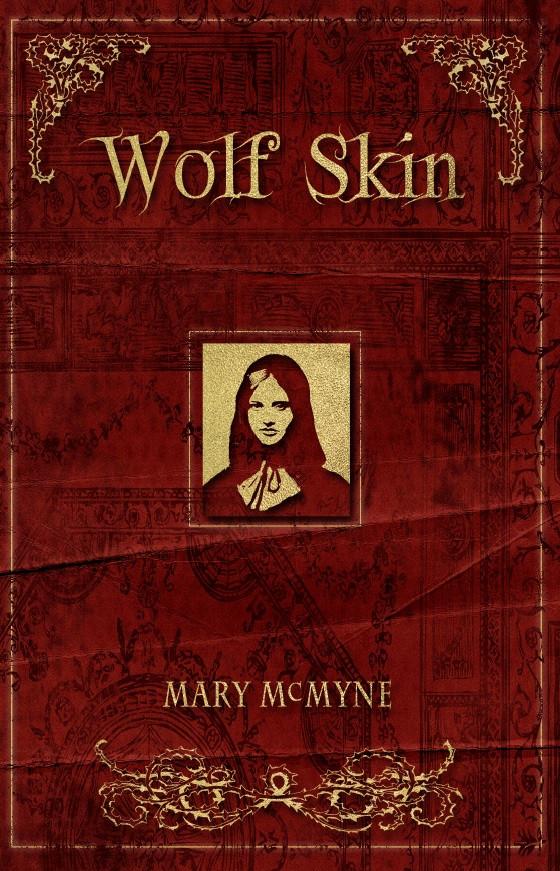The beauty of being eaten by the wolf is that you do not remember…
Winner of the 2015 Elgin Chapbook Award
A poetry chapbook from Dancing Girl Press, Wolf Skin follows a modern woman whose mother told her dark fairy tales when she was a girl. Many of the poems in the collection retell the tales of the Brothers Grimm from new perspectives, such as the huntsman from Little Red Riding Hood, the witch from Rapunzel, and the woodcutter’s wife from Hansel and Gretel. Others allow heroines like Red Riding Hood and Rapunzel to correct popular misconceptions about their tales.
Includes poems first appearing in Pedestal Magazine, Painted Bride Quarterly, Los Angeles Review, and elsewhere.
Click here to order (allow 3-4 weeks for processing).
Add this book on Goodreads
Read Goodreads Reviews
For the novel exploring these themes, see The Book of Gothel.


Wolf Skin
The huntsman was just passing the house. How the old woman snores, he thought, you must see if she needs anything.
— from “Rotkäppchen” by Jacob and Wilhelm Grimm (1812)
Inside, the shadows shape a riddle, a story. The half-burnt candle in the kitchen, the unwashed dishes. The cloth-covered basket by the door. From the hook on the wall, neatly hung, the red ripple of fabric. The crackling fire. The light flickering in the hall. In the bedroom someone is sleeping. At the foot of the bed, two well-worn slippers. On the side table, one book. One pair of spectacles. Night fills the room like cradlesong.
There it is again, that strange buzzing sound. There it is again, from the bed. Such a little old woman could not make this noise. When the log falls into the fire, and the light hits the shape under the blankets, when the log falls into the fire, and you see the claw dragging the floor, you have already begun to rush at the bed with the scissors, you have already resolved to slit the beast open, the word hero stinging your tongue—
In the story you tell your friends, you’ll say you took home the wolf skin as a trophy. You’ll say the old woman thanked you, and the girl went on about how frightened she was. But the truth is the girl spoke only three words that day: Who are you? The truth is the grandmother only whispered, white with shock, as she drank the wine: We were dead. It was dark when you left the grandmother’s house, and cold. When you tried on the wolf skin, the stars laughed. Dead leaves crackled under your feet like fire.
originally appearing in Los Angeles Review #13
Advance Praise
Who knew that a poet would come by one day and reanimate the ancient, tragic fairytale figures of Little Red Riding Hood and Rapunzel? And that she would not only reanimate those uneasy ghosts stalking the roots of memory, but also the ghostly plants and animals of the world that devoured and mourned them? Well, she has: it’s Mary McMyne, with her flute of life, blowing healing air into archetypal pain. One by one her ancestral victims rise from the cannibal fog of our oldest past to live in these marvelous prose-poetry stereopticons. Stories to be truly chilled by, wolf hair by wolf hair.
—Andrei Codrescu, author of So Recently Rent a World: New and Selected Poems, 1968-2012
In these poems, at the nexus of science and mythology, Mary McMyne delicately dissects wolf, butterfly and crocus with the same careful intensity. Wolf Skin entrances even as it invites us into a world of princes-turned-hedgehog, mothers who disappear, and characters skeptical of their stories. One poem begs, “Huntsman, leave us, like stones in the wolf’s belly, without memory…” but this is a collection you will return to and remember.
—Jeannine Hall Gailey, author of Becoming the Villainess, She Returns to the Floating World, and Unexplained Fevers
“Enter the wood, dark and wild, the trees that bend,” sings a voice from Mary McMyne’s quiet, powerful poems, and the enchantment begins. In the rich textures of her work dwells the terrible beauty of trapped things—a butterfly behind glass; a daughter within her mother’s memory; and a girl, always a girl, in a tower, in a wood, in a wolf. As these figures say their names, they tell, too, the price of liberation from—and into—story. Enter these poems, and know their hungers. Some of them will call to you, like the red-capped child in “The Girl Who Came Before” who says, “It is time for us to drown./ It is time for us to touch the moon.” Some of these poems you may never leave.
—Sally Rosen Kindred, author of No Eden and Book of Asters
Reviews
McMyne’s elegant lyricism elevates the verse, giving the fairy tales a weird significance that the many epigraphs in the chapbook (translated, typically from the original German) lack… Her details, such as the Latin name of a plant or butterfly, are authenticating, an important feature of fantastical genres. Such details allow the reader to suspend disbelief and trust the world of the text.
—Gregg Murray, “Confessionalism and High Modernism in Recent Work by Sampson Starkweather, Mary McMyne, and Okla Elliot,” The Chattahoochee Review
Reaching beyond the simple retelling or recasting of the myths that compose our culture’s symbolical landscape, Mary McMyne’s Wolf Skin (2014) weaves brave, dark versions of the Red Riding Hood, Rapunzel, and Hansel and Gretel tales into the emerging identity of a textual version of the poet. In doing so, she creates a new myth about mother- and daughterhood, contrasting the mortality of self and body with the immortality of love. What’s most impressive about this collection is the way that it builds a mere twenty pages into a single composition that illuminates and complicates both the individual speaker and mythical characters, each informing the other… Before any myths have even been mentioned, the book’s central symbology is established: mothers, children, and flying creatures that mediate the connection between the dead and the living… Wolf Skin catches the reader in its snare, personalizing the universal girl of myth and universalizing the individual woman/poet/speaker by blending them together, and in so doing invites readers to identify as closely with the poet-voice as we’re meant to identify with the cautionary figures of our most basic myths.
—Saara Myrene Raappana, “The Better to Transform You With,” American Book Review
In McMyne’s retelling of these familiar tales, we’re reminded of the darker themes lurking behind characters we’ve come to associate with youthful innocence… And so we encounter the wolf lurking at the doorstep where a girl laps at her popsicle, the prince who’s been cursed to live as a hedgehog, the pregnant and yearning princess captive in her tower. Indeed these reminders often deal in fierceness–how it can be assumed or appropriated, how growth and heroism seem intertwined. And, perhaps most importantly, how these values and lessons transcend and permeate into our time, today, where still we find what’s necessary at odds with what makes for a compelling hero’s tale. The collection begins and ends with the image of a moth from the mother’s collection, perfect and asphyxiated, pinned to a corkboard. As an expression of both the fairy tales she illustrates and of the book itself, this image carries acute resonance: delicate, inquisitive, and a tinge darker than people might expect.
—Jennifer Dane Clements, review at As It Ought To Be
Nineteen elegant poems in this simulated antique handmade edition reflect contemporary insight into fairy tales whose origins are lost in time. Native of south Louisiana, Mary McMyne writes poems flavored by the moon shine of Southern Gothic and puts them in a butterfly frame. There is a witchy cognitive connection between “the woman in my head who pinned monarchs to cork” mentioned in the first poem, “The Butterfly Dome,” and the poems that follow. “Lepidoptera” reveals that “unlucky” butterflies sleep “Under glass,” “wings wide open – married to cork” while the woman who collects them dreams of flight as she transfixes their wings. This dichotomy of love and death, freedom and captivity, power and powerlessness is a reoccurring motif “pinned down” throughout the collection…. Much is contained in this small package of poems. Highly recommended.
—Sandra J. Lindow, Science Fiction Poetry Association, review in Star*Line
I love the succinctness, the brevity of what it takes to subvert a well-known fairy tale in a poem. I love what a capable poet can do to give a character added depth, more back-story, which totally changes your emotional attachment, or simply to re-invent the tale altogether, spinning it onward from the traditional ending or telling it from an alternate point of view, in such a narrow space. Mary McMyne is one of these capable poets.
—Diane Severson Mori, “Poetry Review–Wolf Skin by Mary McMyne,” Amazing Stories Magazine

14 thoughts on “WOLF SKIN”
Comments are closed.